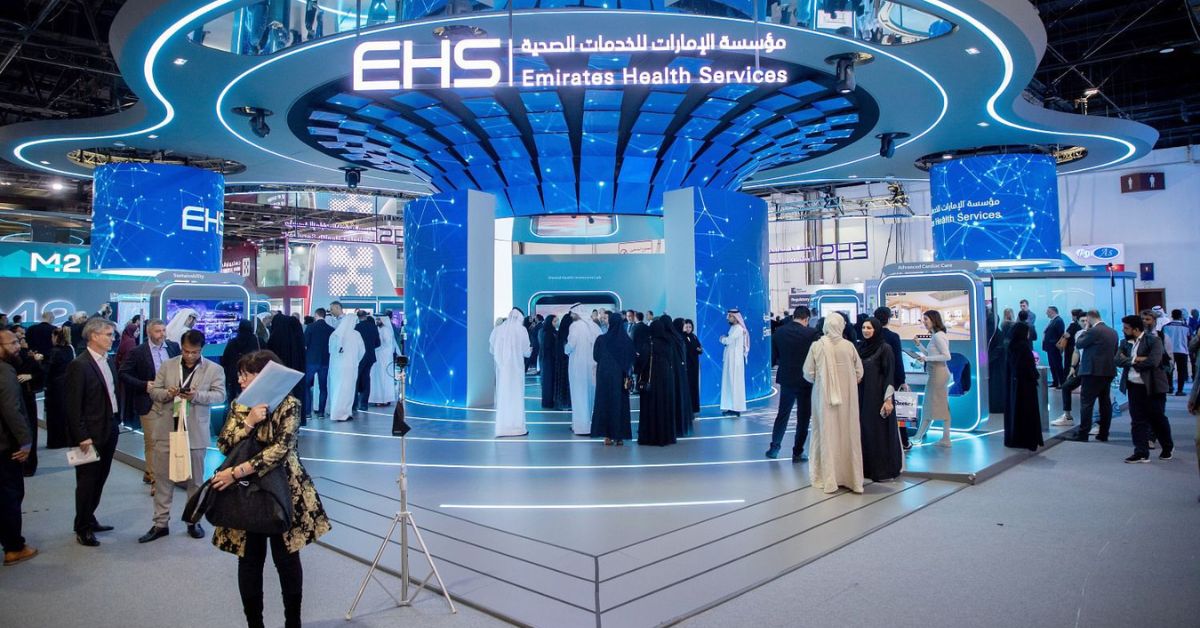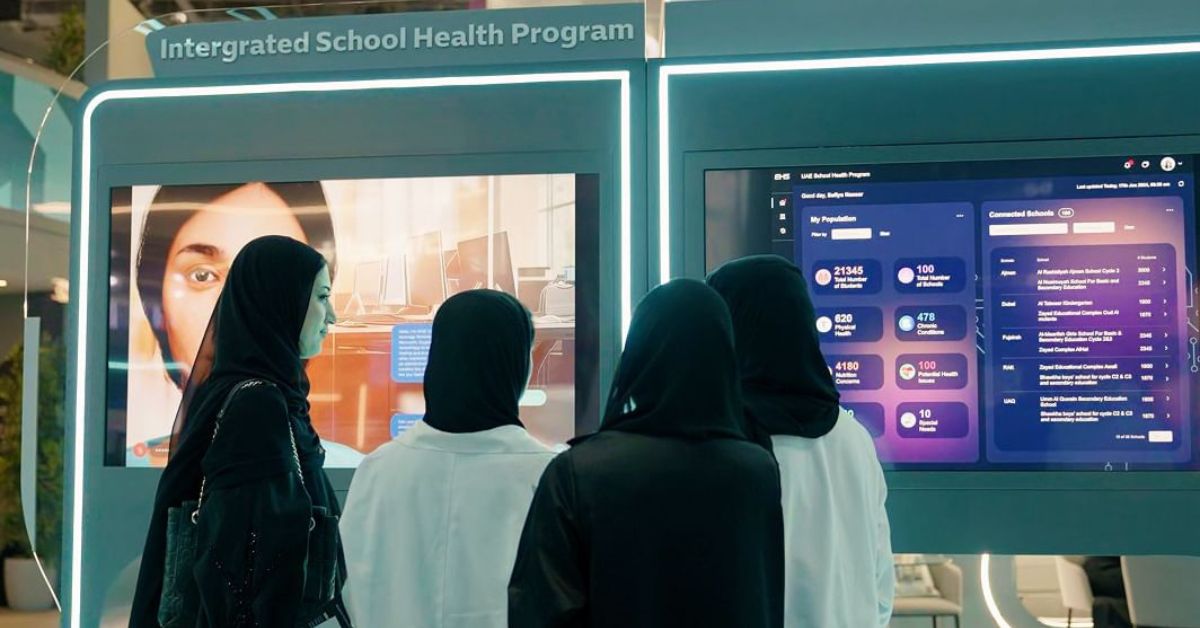ABU DHABI — The healthcare sector in the United Arab Emirates is at the brink of a major transformation, with spending expected to soar to US$ 30.6 billion (AED 112.7 billion) by 2027, as highlighted in a groundbreaking white paper by Dubai Science Park.
In partnership with EY, the white paper, “The UAE Healthcare Ecosystem,” explores global megatrends shaping the healthcare landscape and their potential to revolutionize the ecosystem for the advancement of personalized and precision medicine in the UAE.
The Shift Toward Digitally Enabled Healthcare
A key finding of the paper is the significant shift toward digitally enabled healthcare. Released on the first day of the Arab Health exhibition, the document points out that the healthcare industry now produces roughly 30 percent of the world’s total data volume. It examines how investments from both the public and private sectors are utilizing this vast data resource to lead the integration of emerging technologies, promoting innovative therapy methods, and personalized patient care models.
At A Glance Major Transformation in UAE Healthcare: Spending expected to reach US$ 30.6 billion by 2027, signaling a transformative era for the sector. Digitally Enabled Healthcare: The industry now produces 30% of the world's data, with significant shifts towards the integration of digital technologies. Precision Medicine Focus: Emphasizes a shift from traditional healthcare to precision and personalized medicine, enhancing treatment effectiveness. Structural and Economic Impact: Healthcare's contribution to the UAE's GDP expected to remain above 4.3% from 2023 to 2027. Emiratization in Healthcare: Over 1,200 citizens joined the healthcare sector in Abu Dhabi, reflecting efforts to nationalize the workforce. Health Insurance System Strength: Dubai's health insurance system reported spending of AED 21.4 billion in 2022, demonstrating robust growth and sustainability. Genomic Medicine Investment: Identifies genomic medicine as a key area for future investment, leveraging technology for enhanced drug development and personalized care.
Marwan Abdulaziz Janahi, Senior Vice President of Dubai Science Park at TECOM Group PJSC, stresses, “Investing in localized research and initiatives is not just a scientific necessity but also a commitment to transforming healthcare for the better in the Middle East and elsewhere.”
Precision Medicine as a Paradigm Shift
The white paper emphasizes the revolutionary role of precision medicine, marking a significant departure from the traditional one-size-fits-all approach. This method offers more effective and specific treatments, in line with the healthcare sector’s focus on patient-centered care. The document details the dedication to raising awareness of these groundbreaking opportunities, as demonstrated by initiatives like Dubai Science Park’s new white paper.
Structural Forces Impacting Healthcare in the UAE
The document examines the structural forces affecting the UAE’s healthcare sector, projecting that the industry’s contribution to GDP will remain above 4.3 percent between 2023 and 2027.
Healthcare spending in the UAE has been on a steady rise, reaching US$ 21.51 billion (AED 79 billion) in 2022, with an expected annual growth rate of 7 percent through 2027.
At the same time, the Department of Health in Abu Dhabi announced that more than 1,200 male and female citizens had joined the healthcare sector in Abu Dhabi, six months after the department set Emiratization targets in the sector to provide new job opportunities for national cadres.
Investing in localized research and initiatives is not just a scientific necessity but also a commitment to transforming healthcare for the better in the Middle East and elsewhere.
Marwan Abdulaziz Janahi, Senior Vice President of Dubai Science Park
This led to a 12 percent annual increase in the number of national cadres working in the sector. Abu Dhabi achieved significant progress in meeting its targets for the employment rates of university graduates.
Meanwhile, a report issued by the Dubai Health Authority showcased the strength and dynamism of the health insurance system, the sustainability of its services, and its notable progress amidst the sector’s ongoing development. The total spending on healthcare services through this system, one of the most advanced in the world, reached AED 21.4 billion in the past year (2022), including AED 21.2 billion in Dubai and AED 179 million outside the emirate.
The results of the health accounts report for the Emirate of Dubai, “Hasad,” for the year 2022, indicated that health spending accounted for 5.2 percent of the total gross domestic product of the Emirate of Dubai, with the per capita expenditure on healthcare reaching AED 4,525 in 2022.

The report provided detailed data on the spending process and analyzed it through three main analytical paths. The first path, “the party to whom it was spent,” showed that 52 percent of the total health spending was directed towards hospitals, 23 percent to outpatient clinics, and 15 percent to retail pharmacies and support service providers.
Regarding the second path, on the “quality of services,” it was found that 61 percent of the total health spending in 2022 was for therapeutic services, 15 percent for medical materials and supplies, including medications, and 13 percent for supportive services. As for the third path, “spending,” the report revealed that health care spending was financed by the government at a rate of 43 percent, by private insurance at 47 percent, and by families and individuals at 10 percent.
Genomic Medicine: A Focus on Future Investments
The paper identifies genomic medicine and research as pivotal areas for future investment. Viewed as technologically driven initiatives, these efforts are anticipated to enhance drug development and enable preventive and personalized medicine. Notably, the white paper highlights the Emirati Genome Program, which utilizes advanced sequencing technology and AI analysis to compile genetic references for improved diagnosis, personalized healthcare, and treatment pathways.
Early Findings on Sustainability
Early findings regarding sustainability within the UAE’s healthcare system were revealed at the COP28 conference in Dubai, highlighting the commitment to addressing wider environmental and social considerations alongside the pursuit of healthcare excellence. As the white paper lays the groundwork for transformative healthcare advancements, it heralds a promising future where innovation, sustainability, and precision meet to benefit patients and the wider community.

